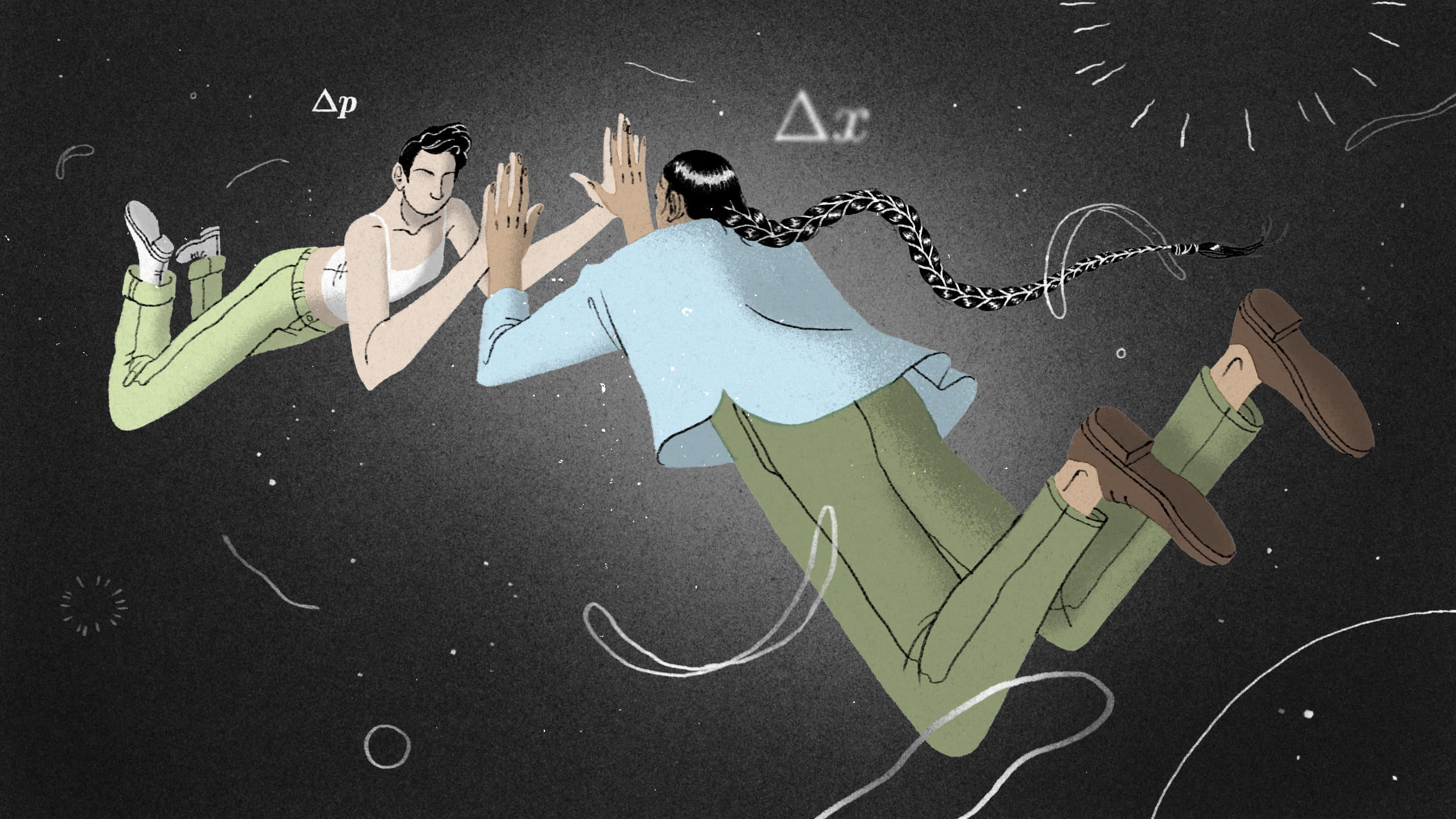“But is that what you want?” she asked over the phone at 2 a.m. “I don’t know,” I responded, genuinely torn. “Well, what do you expect from me?” she asked. We’d been casually dating for a few months, and she’d been lowering the bar of expectation faster than I could see it drop. What did I expect at that point? “Nothing… nothing at all,” I responded. That would normally make her happy, she explained, but she felt sad because it didn’t seem like what I wanted.
She was right—I knew it deep down, but I wasn’t listening to myself at the time. I wasn’t listening to her, either.
She said she felt like giving me a hug, but what I heard was that she wanted to hug me, so I went over to her place in the middle of the night. I thought she was offering connection when really, it was more like consolation.
I don’t know much about physics, but when I first learned the Heisenberg uncertainty principle it stuck with me because it seemed kind of poetic. The principle tells us that you can never accurately measure the speed and position of objects that are too small to be observed; you can only ever know one of those two things with any amount of certainty. In fact, any attempt to measure one of those things automatically changes the other. I thought that physics was more exact, with its laws and formulas about how the universe behaves, but it felt so human to have this much uncertainty built into it.
“You can never accurately measure the speed and position of objects that are too small to be observed.”
I felt that same uncertainty in this relationship. We were like two subatomic particles moving in space, never really able to be in the same place or time. That tension created a dance that I was simply terrible at.
It was a fast and intense first month, though, and I really liked her. I still miss being in that time and space, before I knew that I wasn’t in the right time or space. I didn’t feel the uncertainty then, just conviction and hope and excitement. At first, there wasn’t much distance between us. The exchange was simultaneously fast and slow: witty text exchanges, lingering kisses, rapid banter, slowly creating and then quickly consuming any space between us.
I was overwhelmed from connecting with someone so quickly, but the connection felt deep. As a later-in-life lesbian (I came out in my late 30s), this was outside of my experience. Although I’d dated and had a few relationships already, this one had more enormity for me than it did for her, who was significantly younger but far more experienced than me. I also thought (wrongly) at the time that I was someone who was genuinely ready to meet a genuine someone, so our timing felt off too.
She tried many times to tell me where she was and what (little) she wanted, but my own head and hopes and optimism got in the way of actually seeing that. I was finishing her sentences with my own hopeful endings; I always added a “but.”
It was bad timing, she said, fresh out of a long-term relationship; but, I added silently, maybe timing won’t matter if things are good enough. When she needed more space I thought, but maybe I could push through her barriers. Optimism stranded me in a time and space that only I inhabited.
Part of the problem was that half of the time, I was in another time. My mind would either transport me to the past or try to launch me into the future, ruminating over things I couldn’t change or imagining how things might unfold down the road. As a result, what was being said and what I was hearing were often two completely different things.
Either way, I wasn’t really there. I missed so much reality being stuck in those other times.
“Waiting for the future was excruciating and I was always ahead of myself.”
Instead of enjoying our last few minutes together while driving her home one night, I was busy thinking ahead to the moment I’d drop her off and wouldn’t know when I’d see her next. She could see that I was stuck in a thought, somewhere else, but I never told her where.
Waiting for the future was excruciating and I was always ahead of myself. I was stuck on fast-forward and she was on pause, at times even walking us back in reverse. I tried so hard to get to the same place, but my attempts only changed her location; I had no hope of finding her from whatever parallel time I was lost in.
I bent to her needs while simultaneously thwarting my own, but I have a history of ignoring myself. As a recovering people-pleaser, I can see now that this dynamic echoed my childhood narrative: I sought approval and defined myself by external standards instead of my own internal compass, always terrified to truly be myself. And over the years, I bent myself into whatever shape my environment allowed. In relationships, I was only able to fit whatever space I was given, and I never fought for any more. I’ve only recently begun to command more real estate.
But with her, having my own needs was a punishable offence. The first good month ended when I tried to assert myself and ask for something that I needed from her, which only increased the divide. In that moment, my own needs sank back down inside of me and connected to a deeper wound: the feeling that I didn’t matter, like I should just defer to someone else.
That’s when I felt her pull away, and that’s when the uncertainty crept in. I grasped for connection while she clamped down for space, and any real hope of intimacy fell through that distance between us. The more certainty I wanted from her, the less I got, and my attempts only changed her trajectory. That was the beginning of the end. She relegated me to a space I could never escape from, a space that I didn’t realize I’d been in until our time together ended a few months later.
“I grasped for connection while she clamped down for space, and any real hope of intimacy fell through that distance between us.”
The intentions of my words were always good but their impact was often too heavy and not what I anticipated. I told her things that were meant to make her feel special, about the ways I was newly vulnerable with her. But looking back, that just added pressure and obligation. The reception of my words was so different from their purpose.
While my words often carried too much weight, I never learned to give hers the lightness with which she meant them—I wasn’t listening to the inconsistencies, the space between her words and her actions that were practically screaming at me. “We should go back to that bar we had our first date at,” she’d suggest but then never make the time for. “I’d love to buy you a drink on your birthday,” but then not show. One time over the phone, she said she wanted to debate that I wasn’t an open book, which I thought could be a productive and meaningful discussion between us. But when we were out at a quiet bar having a glass of wine together—the perfect intimate place for what I’d hoped would be an intimate conversation—and I brought it up, she had no recollection of her suggestion.
That was the exact moment that I knew we were in two different places of the same relationship. I teared up a bit as the realization hit me, but then immediately tried to push it back down. I pretended that my tears were about something else when she noticed, too hurt and embarrassed to admit the truth of that moment for me. Very suddenly, she felt a whole universe away. But looking back, she had been drifting off into the distance for a while.
I wasn’t really being honest with myself about my location, but she saw me clearly. She ended it soon after, explaining that she couldn’t get back to that place where it all felt exciting, like at the beginning; instead, it now felt like I wanted more than she could give me. I wanted to get back to that place too, before I had let her diminish me almost entirely.
Maybe my mistake was trying to measure things that are immeasurable. A best-selling author once said, “Relationship and connection happen in an indefinable space between people, a space that will never be fully known or understood by us.” Yet there I was, trying to define that space. My deep need to figure out the right equation, to figure out how to be the right person for her, left me stranded so far from myself and even further from where I wanted to be, which was with her.
This short, failed relationship was the worst kind of uncertainty, but it ultimately brought me to the best kind of certainty—of the self. I was so quick to abandon myself for someone else because that’s what I had always done, and what I would keep doing until I grounded myself.
The relationship only lasted a few months, probably only a sliver of time for her, but it has stretched out much longer in time for me. The lessons I learned with her—in spite of her—will continue to occupy me because they’re how I found myself: by getting so lost in the search for someone else.


 Why you can trust Xtra
Why you can trust Xtra


